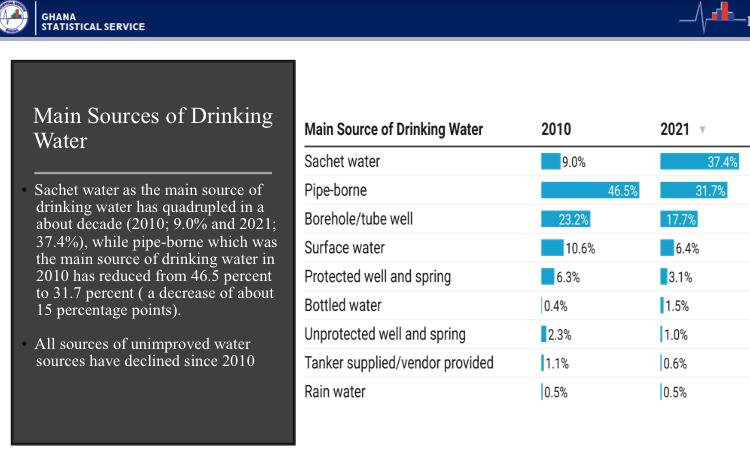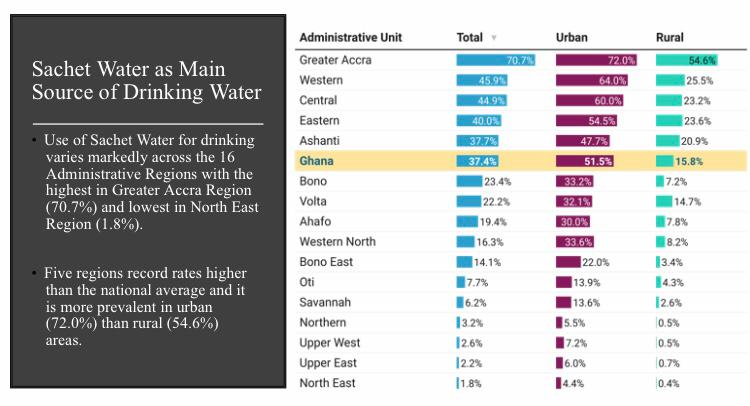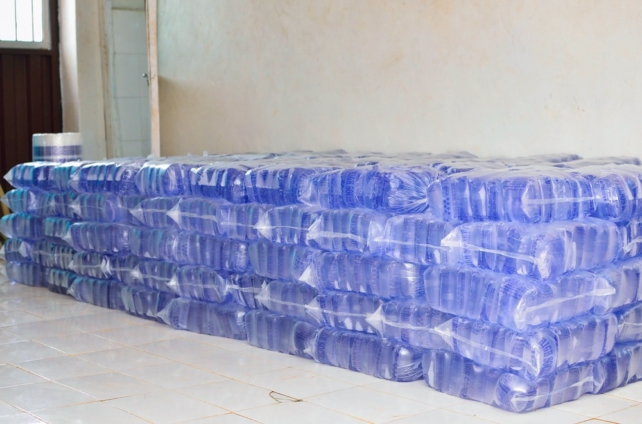The Ghana Statistical Service has described as worrying the growing consumption of sachet water as its previous studies reveal significant faecal contamination in a number of the packaged water on the market.
The Service indicates that consumption of sachet water by households in Ghana has quadrupled in the last decade, from 9% to 37.4%.
However, its multiple indicator cluster survey in 2017 revealed that 34.1% of households had their sachet water contaminated with an appreciable amount of Escherichia Coli.

In 2010, pipe-borne water was pegged as the main water drinking source in most homes in Ghana.
But, the figure is reported to have reduced from 46.5% to 31.7% over the last decade with sachet water becoming the preferred source of drinking water.
According to the 2021 Population and Housing Census, about 37% of the 8.3 million households in Ghana consume packaged-sachet water as their main source of drinking water.
The figure represents a quadruple increase from 9% in 2010.
The consumption of sachet water is said to be prevalent in urban areas (72%) with five regions cumulatively recording higher rates than the national percentage points.
Greater Accra region recorded the highest (70.7%) use of sachet water for drinking while the North-East region was the lowest (1.8%).

However, the Ghana Statistical Service is worried the figure poses a public health threat as a number of water sources for packaged water production have been found to contain faecal matter.
Assistant Chief Statistician with the Ghana Statistical Service, Dr. Peter Takyi Peprah, was speaking at a stakeholder engagement in the Water, Sanitation and Hygiene Sector.
“We need to pay attention to those who are in the production of sachet water. In 2017, a multiple indicator cluster survey was conducted which we didn’t just collect information about the source of drinking water but we tested the quality of these drinking water sources for a household. We realized 34.1% of household drinking water sources have faecal contamination. Faecal contamination simply means we have toilet in our water,” he said.
The engagement in Kumasi was to keep stakeholders in the WASH sector abreast of the findings from the census to inform policy.
Dr. Takyi Peprah is therefore calling for thorough examination of produced sachet water on the Ghanaian market.
“The Food and Drugs Authority must embark on thorough monitoring and supervision of the production of these sachet water. They should try their best to test on regular basis the sources of water in the production of these waters. So that in case the water is contaminated they can advise them to change the source of water or close that company. They always say the water source is either spring water or underground water. Looking at the number of people drinking sachet water it can pose a public threat,” he suggested.
Latest Stories
-
Ecobank-JoyNews Habitat Fair Mini-Clinic opens today at Achimota Mall
7 minutes -
‘Black Stars technical team have helped me a lot’ – Lawrence Agyekum
9 minutes -
Appointments Committee greenlights Justice Ackaah-Boafo’s vetting after dismissing petition
11 minutes -
KNUST Business School celebrates 20 years of excellence in business education
22 minutes -
KNUST TCC-CIMET hosts 3-day international quality management workshop for executives
35 minutes -
There will always be deviants in the fight against galamsey – Martin Kpebu
38 minutes -
‘Not qualifying for AFCON 2025 is not a failure’– Lawrence Agyekum
1 hour -
Bright W. Ladzekpo named ‘Media Leader of the Year’ at 2025 National FMCG Awards
1 hour -
The Republic of Double Standards: Why you can chop at 16 but can’t carry the chop box to marriage until 18
2 hours -
Ghana Para Athletics Association launches nationwide talent hunt to discover future champions
2 hours -
FoSCel hosts national forum on Sickle Cell at UEW: Calls for unity, awareness and policy action
2 hours -
‘I dreamt of scoring my debut goal against Nigeria’– Lawrence Agyekum
2 hours -
‘Nothing tells me we won’t qualify’ – Stephen Appiah confident in Black Stars’ World Cup chances
2 hours -
Ablakwa urges Israeli Ambassador to respect Ghana’s sovereign right to make independent decisions
2 hours -
We will give everything to qualify for 2026 FIFA World Cup – Lawrence Agyekum
3 hours

